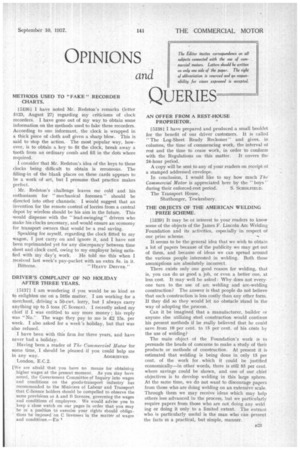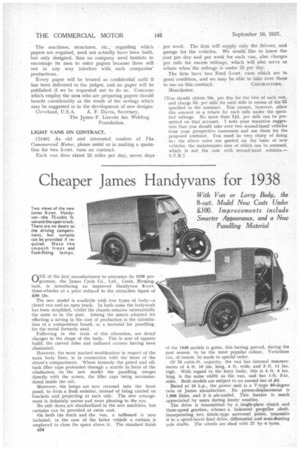OPINIONS
Page 57

Page 58

If you've noticed an error in this article please click here to report it so we can fix it.
and
UERIES
METHODS USED TO "FAKE" RECORDER CHARTS.
151361 I have noted Mr. Redston's remarks (letter 5123, August 27) regarding my criticisms of clock recorders. I have gone out of my way to obtain some information on the methods used to fake these recorders. According to one informant, the clock is wrapped in a thick piece of cloth and given a sharp blow. This is said to stop the action. The most 'popular way, however, is to obtain a key to fit the clock, break away a tooth from an ordinary comb and fill in the dots where required.
I consider that Mr. Redston's idea of the keys to these clocks being difficult to obtain is erroneous. The filling-in of the blank places on these cards appears to be a work of art, but I presume that practice makes perfect.
Mr. Redston's challenge leaves me cold and his enthusiasm for "mechanical foremen" should be directed into other channels. I would suggest that an invention for the remote control of lorries from a central depot by wireless should be his aim in the future. This would dispense with the " lead-swinging " drivers who make his clocks necessary, and would ensure an economy for transport owners that would be a real saving.
Speaking for myself, regarding the clock fitted to my wagon. I just carry on and ignore it, and I have not been reprimanded yet for any discrepancy between time sheet and clock card, owing to my employer being satisfied with my day' k work. He told me this when I received last week's pay-packet with an extra 5s. in it.
Bitterne. "HEAVY DRIVER."
DRIVER'S COMPLAINT OF NO HOLIDAY AFTER THREE YEARS.
151371 I am wondering if you would be so kind as to enlighten me on a little matter. I am working for a merchant, driving a 50-cwt. lorry, but I always carry anything up to 5 tons (C licence). I recently asked my chief if I was entitled to any more money ; his reply was "No.The wage they pay to me is £2 15s. per week. I also asked for a week's holiday, but that was also refused.
I have been with this firm for three years, and have never had a holiday.
Having been a reader of The Commercial Motor for some time, I should be pleased if you could help me in any way. AGGRIEVED. London, E.C.2.
OVe are afraid that you have no means for obtaining higher wages at the present moment. As you may have noted, the Government Committee of Inquiry into wages and conditions on the goods-transport industry has recommended to the Ministers of Labour and Transport that C-licence holders should be compelled to observe the same provisions as A and B licences, governing the wages and conditions of employees. We would advise you to keep a close watch on our pages in order that you may be in a position to exercise your rights should obligations be imposed on C licensees in the matter of wages and conditions.—En 1
AN OFFER FROM A REST-HOUSE PROPRIETOR.
[5138] I have prepared and produced .a small booklet for the benefit of our driver customers. It is called " The Log-Sheet Ready Reckoner" and gives, in columns, the time of commencing work, the interval ot rest and the time to cease work, in order to conform with the Regulations on this matter. It covers the 24-hour period.
A copy will be sent to any of your readers on receipt ot a stamped addressed envelope.
In conclusion, I would like to say how much The Commercial Motor is appreciated here by the " boys "
during their enforced-rest period. S. SCHOLFIELD. The Transport House, Shuthonger, Tewkesbury.
THE OBJECTS OF THE AMERICAN WELDING PRIZE SCHEME.
[51391 It may be 01 interest to your readers to know some of the objects of the James F. Lincoln Arc Welding Foundation and its activities, especially in respect of our prize scheme.
It seems to be the general idea that we wish to obtain a lot of papers because of the publicity we may get out of them, and because of ideas we can spread around the various people interested in welding. Both these assumptions are absolutely incorrect.
There exists only one good reason for welding, that is, you can do as good a job, or even a better one, at less cost. It may well be asked : Why does not everyone turn to the use of arc welding and arc-welding construction? The answer is that people do not believe that such construction is less costly than any other form. If they did so they would let no obstacle stand in the way of adopting the process.
Can it be imagined that a manufacturer, builder or anyone else utilizing steel construction would continue his present methods if he really believed that he could save from 10 per cent. to 15 per cent. of his costs by the use of welding?
The main object of the Foundation's work is to persuade the heads of concerns to make a study of their products or methods of construction. At present it is estimated that welding is being done in only 15 per cent, of the work for which it could be justified economically—in other words, there is still 85 per cent. where savings could be shown, and one of our chief objectives is to develop welding in this large sphere. At the same time, we do not want to discourage papers from those who are doing welding on an extensive scale. Through them we may receive ideas which may help others less advanced in the process, but we particularly require papers from those who are not, doing any weld ing or doing it only to a limited extent. The entrant who is particularly useful is the man who can present the facts in a practical, but simple, manner. The machines, structures, etc.; regarding which papers are required, need not actually have been built, but only designed, thus no company need hesitate to encourage its men to enter papers because these will not in any way interfere with such companies' productions..
Every paper will be treated as confidential until it has been delivered to the judges, and no paper will be published if we be requested not to do so. Concerns which employ the men who are preparing papers should benefit considerably as the result of the savings which may be suggested or in the development of new designs.
Cleveland, U.S.A. A. F. DAVIS, Secretary, The James F. Lincoln Arc Welding
Foundation.
LIGHT VANS ON CONTRACT.
151401 As old and interested readers of The Commercial Motor, please assist us in making a quotation for two 5-cwt. vans on contract.
Each van does about 55 miles per day, seven days
per week. The firm will supply only the drivers, and garage for the vehicles. We would like to know the ,cost per day and per week for each van, also charges per mile for excess mileage, which will also serve as rebate when the mileage is under 35 per day.
The firm have two Ford 5-cwt. vans which are in good condition, and we may be able to take over these to use on this contract. CONTRACTORS. Manchester.
[You should obtain 18s. per day for the hire of each van, and charge 3d. per mile for each mile in excess of the 55 specified in the contract. You cannot, however, allow this amount as a rebate for each mile under the sped. tied mileage. No more than lid. per mile can be permitted on that account. I note your tentative suggestion that you should take over two second-hand vehicles from your prospective customers and use them for the proposed contract. You must be very chary of doing so; the above rates are quoted on the basis of new vehicles, the maintenance cost of which can be assessed, which is not the case with second-hand vehicles.— S.T.R.]




























































































